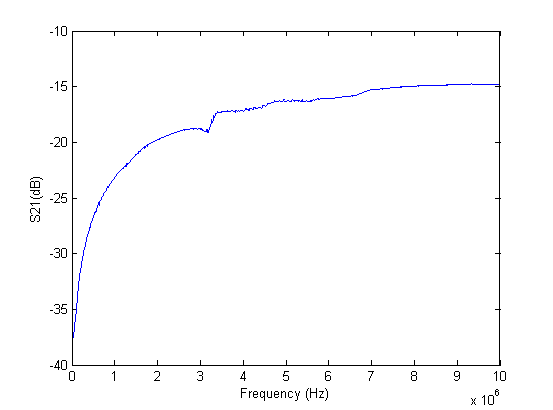What is the goal?
Develop methods for doing dielectric sprectroscopy (DS) measurements of human physiology. The task was split in two main phases: demonstrate ability to do DS on common calibration liquids and exploring how the technique can be applied to human measurements.
Electrode Design
"Tintin" Electrode

This is the simplest electrode design. It has a 1mm gap between the two measurement pads.
Wheatstone bridge


The Wheatstone bridge1 uses the balancing behaviour of the two legs of a bridge to make differential measurements and determine the value of one unknown element. There are different configurations of a Wheatstone bridge that allow you to measure capacitance, inductance and frequency2.
Transmission measurement using ATTiny45
This measurement was done uing the Neil's transmission step response board 3. It works by sending a square wave using the microcontroller's pin (sending pin), which is in turn sampled by the ADC at a precise time ∂t using a second (receiving) receiving. This is used to evaluate the slope of the transmitted wave after it went through the dielectric.
| Condition | Value |
|---|---|
| No Liquid | 1080 |
| 20µL H2O | 21150 |
| 500µM NaCl in 20µL H2O | 34400 |

Signal Generator
In order to have more flexibility about the frequency of the wave being sent, one can use a signal generator + oscilloscope setup to achieve the same measurement as above. Using the Tintin electrode, sending at 2MHz, we obtain the following results for the differential conduction of the wave in a transmission measurement.
-

H2O
Note that the scale is at 1V/div in this picture
-

500µM NaCl in H2O
Note that the scale is at 2V/div in this picture
Network Analyzer
While using the oscilloscope and signal generator in the setup decribed above is informative, it remains a time domain measurement. In order to move to a frequency domain measurement, we use a network analyzer. Note that the higher in frequency you get, the more careful you need to be about setup. For that reason, we limited our use of the analyzer to the GHz order of magnitude.
Wheatstone bridge on Water and Salted Water
S11 (Reflection) Component
-

S11 of Nothing in Wheatstone bridge
-

S11 of 20µL H2O in Wheatstone bridge
-

S11 of 50mM NaCl in 20µL H2O in Wheatstone bridge
-

S11 of 500mM NaCl in 20µL H2O in Wheatstone bridge
-

S11 of 1M NaCl in 20µL H2O in Wheatstone bridge
S21 (Transmission) Component
-

S21 of Nothing in Wheatstone bridge
-

S21 of 20µL H2O in Wheatstone bridge
-

S21 of 50mM NaCl in 20µL H2O in Wheatstone bridge
-

S21 of 500mM NaCl in 20µL H2O in Wheatstone bridge
-

S21 of 1M NaCl in 20µL H2O in Wheatstone bridge
S11 (Transmission) on Forearm
The electrodes were strips of copper tape soldered to a SMA cable
S21 (Transmission) on head
What is that valley at ~3.2 MHz?
-

S21 on head using copper tape strips
-

S21 on head using copper tape strips